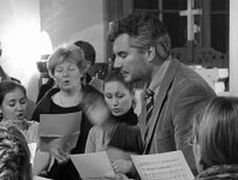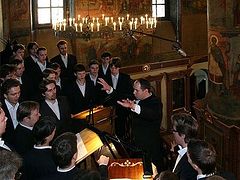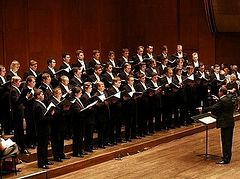Friday, September 14, 2007; Page C10
Working from both sacred and secular texts, Moscow Sretensky Monastery Choir filled the Library of Congress’s Coolidge Auditorium on Wednesday night with a vocal luster that extended as far as the expression of reverence and human passion can reach. And the auditorium was filled to the rafters with listeners, the audience including many religious dignitaries in colorful ritual dress.
Cheers and applause erupted throughout the evening, one stop in the group’s first American tour, which marks this year’s reunification of the Russian Orthodox Church Outside of Russia with the Moscow Patriarchate.
The choir regularly sings for services at its home, a medieval monastery within the Kremlin’s walls. The monastery was taken over by Soviet authorities in 1917 but was returned to the Russian Orthodox Church in 1994, when the choir was established.
The concert opened with four sacred Russian and Byzantine chants, the voices reverberating with powerful but unforced ardor. This sonorous quality dominated even in delicately hushed pianissimos.
Much credit is due to artistic director Nikon Zhila’s bold, definitive conducting, which won the choir’s instant response and tonal splendor with the slightest flick of his fingers.
Before the program began, the 41-member ensemble offered a solemn succession of Russian Orthodox chants in a tribute to the victims of the terrorist attacks of Sept. 11, 2001. The evening continued with Russian, Cossack and Ukrainian songs, followed by romances often in light opera style. Both texts and music centered on themes of nostalgia and yearning, whether for a distant homeland, absent lover or fallen comrade. Among the many fine soloists joining with the choir was the luminous bass Dmitry Beloselsky, whose dark, savory voice often reflected mournful longing for the Russian steppes.



